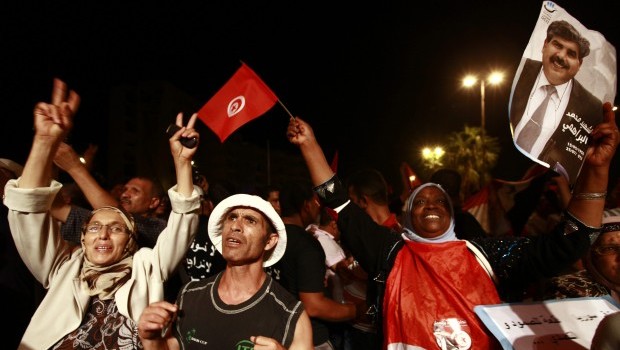
Protesters wave a flag and a picture of slain opposition leader Mohamed Brahmi during a demonstration to call for the departure of the Islamist-led ruling coalition, outside the Constituent Assembly headquarters in Tunis on September 7, 2013. (REUTERS/Anis Mili)
In response to the release of the report, the opposition National Salvation Front’s political wing issued a statement on Saturday demanding a judicial investigation into allegations of government complicity in the murder of Brahmi on July 25, based on the information the interior ministry had about the assassination.
Mohamed Brahmi, a member of a left-wing political coalition, was shot dead by two men on a motorcycle outside his home in Tunis on July 25. His death followed the assassination of another left-wing opposition politician, Chokri Belaid, in similar circumstances in February, sparking large anti-government protests.
The opposition demanded that all those involved be held accountable along with “anyone who is proven to be party to the assassination.” They called on all political parties and organizations, especially those who sponsored the national dialogue, to pressure the government, currently led by the Islamist Ennahda Party, to investigate why security forces had not prevented the assassination.
Hamma Hammami, a spokesperson for the Tunisian Workers’ Communist Party, told Asharq Al-Awsat that the document warning of the assassination plot reached the interior ministry on July 14. He said the document was signed by the specialist department, the foreign relations department and the department of national security, which are three of the most important departments at the interior ministry. This, he claimed, proved complacency and complicity, which makes the assassination of Brahmi a “state crime.”
Meanwhile, Tunisian Minister of the Interior Lutfi Ben Jeddou issued a statement denying that he was aware of the document. He said he was “surprised when he discovered after the assassination that a report had been delivered to the ministry which warned about a plot to assassinate Brahmi.”
Ben Jeddou demanded an investigation be opened to reveal the identity of those responsible for “failure to disclose the warning document” despite receiving it two weeks before Brahmi’s assassination.
The interior minister pointed to the fact that the security forces had foiled a number of terrorist attacks and political assassinations, and that it was not in their interest to allow assassinations to take place.
Meanwhile, Mohamed El-Hamedi, the secretary-general of the Democratic Alliance Party, told Asharq Al-Awsat that suitable conditions for a return to the Constituent Assembly were not present because of the absence of a political solution to the crisis, which was worsened by Brahmi’s assassination.
He suggested that a committee comprising parties, parliamentarians and experts be formed to resolve the contested points in the constitution, and another committee to prepare the country for the next parliamentary and presidential elections.
